Evenings spent lounging in your yard, enjoying the barbecue and the company of your friends can sadly also be all about mosquitoes. The tiny parasites can suck all the joy out of an evening with friends and family just as quickly as they'll suck the blood from your arm. Chemical repellents are easy to find, but there are also plenty of natural mosquito deterrents you can keep — or may already have — around your home.
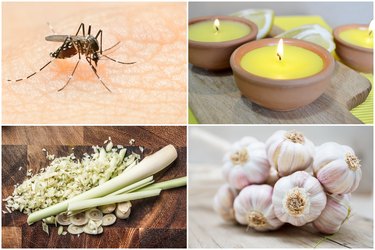
Video of the Day
1. Garlic
Garlic is one of the world's best-loved flavors, so the aromatic bulbs are inexpensive and easy to find, even if you don't have any on hand right this minute. In one of life's little ironies, mosquitoes hate garlic just as much as movie vampires do, so it makes a good repellent for patios and other outdoor areas. Whizz a few cloves into the blender with some water, strain the result, and spray it around for a few days' protection. Humans won't notice the aroma after the first couple of hours, but mosquitoes will.
Video of the Day
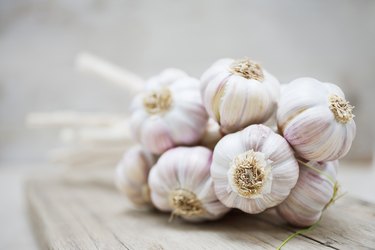
2. Citronella
Citronella has been used as a backyard mosquito deterrent for generations, because it really does work. Like most natural repellents it's not 100 percent effective, but it does dramatically cut down on the number of mosquitoes you'll encounter in the back yard. You can buy it ready to go in candle or torch form, for use on the deck or patio, or as an essential oil you can use to DIY a mist for outdoor use or a spray-on repellent for your skin. It's also commonly used in natural-formula repellent sprays you can buy.
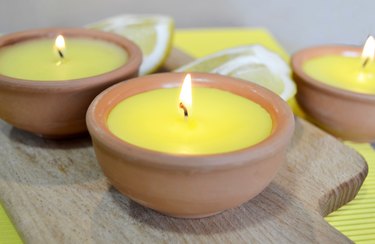
3. Used Coffee Grounds
Spraying yourself with some kind of goop isn't the only way to cut down on your mosquito problem. Another good option is to mess with their breeding cycle, so there are fewer mosquitoes to begin with. Governments do this by spraying pesticides over huge areas, but in your backyard, used coffee grounds will do the trick. Just save the grounds from your coffee maker, and sprinkle them liberally anywhere you see standing water. The acidity of the grounds helps keep the 'skeeters from reproducing successfully.
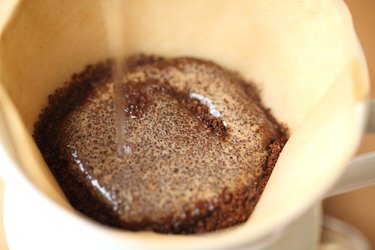
4. Mint
Garlic isn't the only common kitchen ingredient mosquitoes detest. Another is mint, which mosquitoes hate just as much as humans love it. If you have mint essential oil, you can add it to a spray bottle of water and mist it around your patio. Mixed with a carrier oil as well, you can use it as a spray-on repellent (test it on a small area first, in case you have a skin reaction). The fresh plant works as well: Grow it around your patio, and periodically crush a leaf to release its scent. You can even rub them on your skin, in a pinch.

5. Fresh or Refined Lavender
If you grown lavender in your garden, or buy it regularly to use as a natural air freshener, you already know that its aroma is both wonderful and penetrating. Mosquitoes don't care for it at all, which is bad for them but good for us. If you plant lavender around your patio, or in planters on your deck, it will help keep mosquitoes at bay. Just crush a few leaves or flowers periodically, or even rub them on your skin. Lavender essential oil, diluted and misted through a spray bottle, will also help keep the area relatively mosquito-free.

6. Tea Tree Oil
If you already keep tea tree oil in your house for its antimicrobial properties, we have good news: It helps keep non-microscopic invaders at bay, as well. Diluting the oil with water and misting it periodically around your patio will help deter mosquitoes, but it works best when used in a DIY repellent. Add a neutral oil such as soy oil to the mixture, and mist it right onto your skin (after checking in a small area, first, to make sure you won't have a reaction to it).
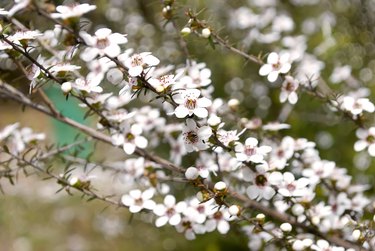
7. Oil of the Lemon Eucalyptus
Australia is home to a number of different eucalyptus trees, and one of them — Corymbia citriodora, or "lemon eucalyptus" — yields a pleasantly lemon-scented oil that's startlingly effective in repelling mosquitoes. In fact, it's so effective that it's used in a lot of commercially-made "natural" bug sprays. If you're shopping for it, be sure to get the kind that's meant for use as an insect deterrent. There's an essential oil available as well, but like other essential oils it's super-concentrated and you'll need to dilute it carefully and test it on your skin before use.
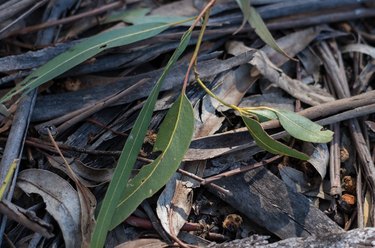
8. Lemongrass
Lemongrass is one of the signature ingredients in Asian cooking — as the name suggests, it lends a bright, lemony flavor to dishes. It's the source of citronella oil, and contains the same active ingredient (a substance called geraniol) which effectively repels mosquitoes. You can plant the grass itself as an ornamental around your outdoor living areas, where its six-foot clumps will provide architectural drama as well as a pleasant aroma. Alternatively, infuse finely minced lemongrass in water and strain it to spray, or buy concentrated lemongrass oil and dilute it.
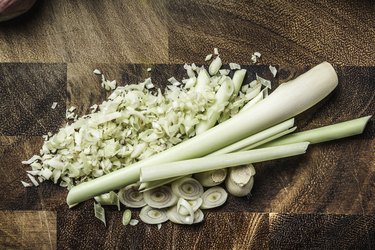
9. Catnip and Catnip Oil
The mint family includes a lot of popular herbs, and many of them actively discourage mosquitoes. One of the more effective options is catnip. Like any other mint it makes a pleasingly aromatic addition to any planter, and its spikes of purple flowers are appealing to the eye as well. Crushing the leaves or flowers to release the plant's aromatic oils will help keep biting bugs at bay, or you can buy an dilute catnip oil for spraying. Bear in mind that while it repels mosquitoes it attracts cats, which (depending on your perspective) might be a good or a bad thing.
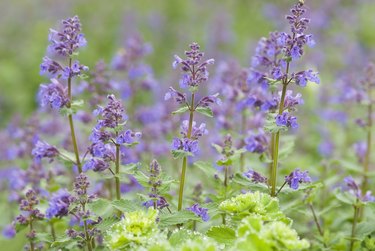
10. Dry Ice
Okay, we'll admit dry ice isn't really something you can keep around the house...but if you're already getting a piece to keep your drinks cold for the weekend, you can repurpose it as a highly effective mosquito trap. Mosquitoes are attuned to the carbon dioxide we exhale — that's how they find us — so to them, a concentrated source of CO2 is the irresistible equivalent of the smell of bacon or fresh-baked bread. To trap them, use tongs to place a chunk of dry ice in an old pillowcase and hang it up a short distance away from where the humans are gathered. Mosquitoes will flock to it, and die in quantity, for up to 24 hours.
